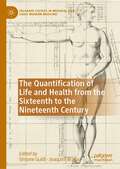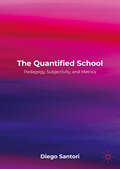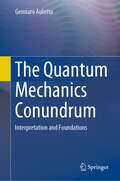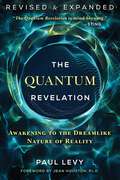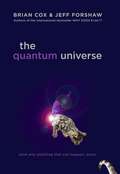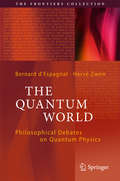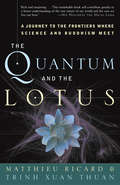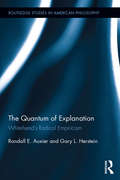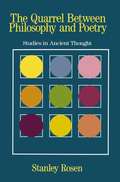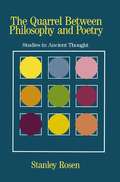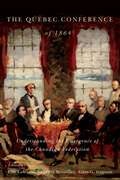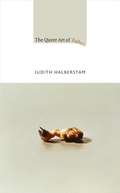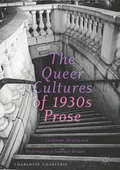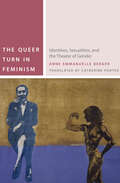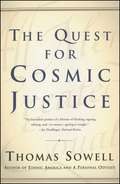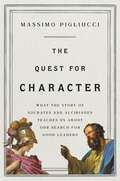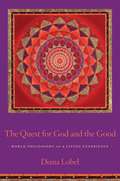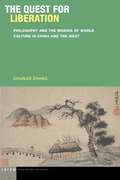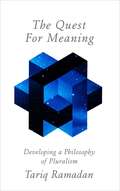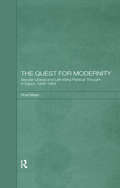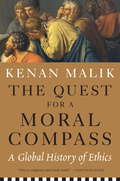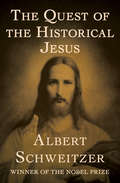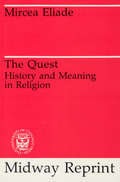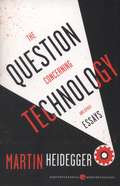- Table View
- List View
The Quantification of Life and Health from the Sixteenth to the Nineteenth Century: Intersections of Medicine and Philosophy (Palgrave Studies in Medieval and Early Modern Medicine)
by Joaquim Braga Simone GuidiThis edited volume explores the intersection of medicine and philosophy throughout history, calling attention to the role of quantification in understanding the medical body. Retracing current trends and debates to examine the quantification of the body throughout the early modern, modern and early contemporary age, the authors contextualise important issues of both medical and philosophical significance, with chapters focusing on the quantification of temperaments and fluids, complexions, functions of the living body, embryology, and the impact of quantified reasoning on the concepts of health and illness. With insights spanning from the sixteenth century to the nineteenth century, this book provides a wide-ranging overview of attempts to ‘quantify’ the human body at various points. Arguing that medicine and philosophy have been constantly in dialogue with each other, the authors discuss how this provided a strategic opportunity both for medical thought and philosophy to refine and further develop. Given today’s fascination with the quantification of the body, represented by the growing profusion of self-tracking devices logging one’s sleep, diet or mood, this collection offers an important and timely contribution to an emerging and interdisciplinary field of study.
The Quantified School: Pedagogy, Subjectivity, and Metrics
by Diego SantoriThis book develops a theoretically rich analysis of quantification and subjectivity, tracing new linkages between educational policy and everyday life in schools, diving deeper into ‘ordinary’ schools as they encounter and navigate quantified forms of recognition. With a focus on Chile as a critical case of neoliberal experimentation, this book investigates whether intense exposure to quantified forms of meaning and sense-making in school settings could develop into metrics-driven dispositions or attachments. Contemporary demands on schools for calculation, prediction, and comparison by the use of accountability tools like high-stakes testing, league tables, consequential inspection ratings and ‘progress’ measures evidence the relentless presence of quantification in teaching and learning. This book argues the importance of bridging political, sociological and anthropological literatures together with affect and subjectivity theories to understand the complex ways in which standardisation, optimisation, automation, and surveillance crystallise into quantification-based forms of intelligibility.
The Quantum Mechanics Conundrum: Interpretation and Foundations
by Gennaro AulettaThis comprehensive volume gives a balanced and systematic treatment of both the interpretation and the mathematical-conceptual foundations of quantum mechanics. It is written in a pedagogical style and addresses many thorny problems of fundamental physics.The first aspect concerns Interpretation. The author raises the central problems: formalism, measurement, non-locality, and causality. The main positions on these subjects are presented and critically analysed. The aim is to show that the main schools can converge on a core interpretation. The second aspect concerns Foundations. Here it is shown that the whole theory can be grounded on information theory. The distinction between information and signal leads us to integrating quantum mechanics and relativity. Category theory is presented and its significance for quantum information shown; the logic and epistemological bases of the theory are assessed.Of relevance to all physicists and philosophers with an interest in quantum theory and its foundations, this book is destined to become a classic work.
The Quantum Revelation: Awakening to the Dreamlike Nature of Reality
by Paul Levy• Shows how the revelations emerging from quantum physics can wake us up from the disempowering spell of the scientific materialist worldview and help dispel the collective madness that has befallen our species• Explains for readers with no physics background why quantum physics is, in the words of Albert Einstein, so &“uncommonly important&” that &“it should be everyone&’s concern&”• Shows how quantum physics can help us awaken to the malleable, dreamlike nature of reality, a realization that unlocks the creative spirit within usExplaining the world-transforming effects of quantum physics, Paul Levy shows how discoveries in this field—widely considered the greatest in the history of science—can wake us up from the disempowering spell of the reductionist, materialist worldview, thereby helping to dispel the collective madness that has befallen our species. He explains how quantum physics helps us to consciously realize our vast evolutionary potential and awaken us to the malleable, dreamlike nature of reality, a realization that unlocks the creative spirit hidden within our own minds. In a radical synthesis of quantum physics with spirituality, psychology, lucid dreaming, and alchemy, Levy contemplates the deeper philosophical and metaphysical underpinnings of quantum mechanics, exploring what it means that quantum physics has empirically proven that there is no such thing as &“objective reality&” and how we are active participants in creating our experience of reality, whether we realize it or not.Revealing the quantum nature of our world and ourselves, The Quantum Revelation shows how quantum physics has become a modern-day spiritual path for awakening and expanding consciousness with particular relevance for the challenging times we are living through.
The Quantum Universe: (And Why Anything That Can Happen, Does)
by Brian Cox Jeff ForshawThe world we live in is stranger than we can possibly imagine. The closest we've got to understanding it - so far - is with quantum physics. But what is quantum physics? And how, exactly, can it help us make sense of the universe?In The Quantum Universe, Brian Cox and Jeff Forshaw give us the real science behind the bizarre, wonderful, mind-boggling behaviour of the atoms and energy that make up the cosmos, and reveal just how everything that can happen, does happen. 'An engaging, ambitious and creative tour of our quantum universe. ' Guardian'Given that Einstein himself never quite got his head around the quantum universe, the task that the two professors have taken on - to demystify quantum physics - is not to be taken lightly . . . they do a great job. ' The Times'As breezily a written accessible account of the theory of quantum mechanics as you could wish for. ' Observer'The authors' love for their subject shines through the book. ' Economist
The Quantum World
by Hervé Zwirn Bernard D'EspagnatIn this largely nontechnical book, eminent physicists and philosophers address the philosophical impact of recent advances in quantum physics. These are shown to shed new light on profound questions about realism, determinism, causality or locality. The participants contribute in the spirit of an open and honest discussion, reminiscent of the time when science and philosophy were inseparable. After the editors’ introduction, the next chapter reveals the strangeness of quantum mechanics and the subsequent discussions examine our notion of reality. The spotlight is then turned to the topic of decoherence. Bohm’s theory is critically examined in two chapters, and the relational interpretation of quantum mechanics is likewise described and discussed. The penultimate chapter presents a proposal for resolving the measurement problem, and finally the topic of loop quantum gravity is presented by one of its founding fathers, Carlo Rovelli. The original presentations and discussions on which this volume is based took place under the auspices of the French “Académie des Sciences Morales et Politiques”. The book will appeal to everybody interested in knowing how our description of the world is impacted by the results of the most powerful and successful theory that physicists have ever built.
The Quantum and the Lotus: A Journey to the Frontiers Where Science and Buddhism Meet
by Matthieu Ricard Trinh Xuan ThuanMatthieu Ricard trained as a molecular biologist, working in the lab of a Nobel prize—winning scientist, but when he read some Buddhist philosophy, he became drawn to Buddhism. Eventually he left his life in science to study with Tibetan teachers, and he is now a Buddhist monk and translator for the Dalai Lama, living in the Shechen monastery near Kathmandu in Nepal. Trinh Thuan was born into a Buddhist family in Vietnam but became intrigued by the explosion of discoveries in astronomy during the 1960s. He made his way to the prestigious California Institute of Technology to study with some of the biggest names in the field and is now an acclaimed astrophysicist and specialist on how the galaxies formed. When Matthieu Ricard and Trinh Thuan met at an academic conference in the summer of 1997, they began discussing the many remarkable connections between the teachings of Buddhism and the findings of recent science. That conversation grew into an astonishing correspondence exploring a series of fascinating questions. Did the universe have a beginning? Or is our universe one in a series of infinite universes with no end and no beginning? Is the concept of a beginning of time fundamentally flawed? Might our perception of time in fact be an illusion, a phenomenon created in our brains that has no ultimate reality? Is the stunning fine-tuning of the universe, which has produced just the right conditions for life to evolve, a sign that a “principle of creation” is at work in our world? If such a principle of creation undergirds the workings of the universe, what does that tell us about whether or not there is a divine Creator? How does the radical interpretation of reality offered by quantum physics conform to and yet differ from the Buddhist conception of reality? What is consciousness and how did it evolve? Can consciousness exist apart from a brain generating it? The stimulating journey of discovery the authors traveled in their discussions is re-created beautifully inThe Quantum and the Lotus, written in the style of a lively dialogue between friends. Both the fundamental teachings of Buddhism and the discoveries of contemporary science are introduced with great clarity, and the reader will be profoundly impressed by the many correspondences between the two streams of thought and revelation. Through the course of their dialogue, the authors reach a remarkable meeting of minds, ultimately offering a vital new understanding of the many ways in which science and Buddhism confirm and complement each other and of the ways in which, as Matthieu Ricard writes, “knowledge of our spirits and knowledge of the world are mutually enlightening and empowering. ” From the Hardcover edition.
The Quantum of Explanation: Whitehead’s Radical Empiricism (Routledge Studies in American Philosophy)
by Randall E. Auxier Gary L. HersteinThe Quantum of Explanation advances a bold new theory of how explanation ought to be understood in philosophical and cosmological inquiries. Using a complete interpretation of Alfred North Whitehead’s philosophical and mathematical writings and an interpretive structure that is essentially new, Auxier and Herstein argue that Whitehead has never been properly understood, nor has the depth and breadth of his contribution to the human search for knowledge been assimilated by his successors. This important book effectively applies Whitehead’s philosophy to problems in the interpretation of science, empirical knowledge, and nature. It develops a new account of philosophical naturalism that will contribute to the current naturalism debate in both Analytic and Continental philosophy. Auxier and Herstein also draw attention to some of the most important differences between the process theology tradition and Whitehead’s thought, arguing in favor of a Whiteheadian naturalism that is more or less independent of theological concerns. This book offers a clear and comprehensive introduction to Whitehead’s philosophy and is an essential resource for students and scholars interested in American philosophy, the philosophy of mathematics and physics, and issues associated with naturalism, explanation and radical empiricism.
The Quarrel Between Philosophy and Poetry: Studies in Ancient Thought
by Stanley RosenThe Quarrel Between Philosophy and Poetry focuses on the theoretical and practical suppositions of the long-standing conflict between philosophy and poetry. Stanley Rosen--one of the leading Plato scholars of our day--examines philosophical activity, questioning whether technical philosophy is a species of poetry, a political program, an interpretation of human existence according to the ideas of 19th and 20th-century thinkers, or a contemplation of beings and Being.
The Quarrel Between Philosophy and Poetry: Studies in Ancient Thought
by Stanley RosenNow available in paperback, The Quarrel Between Philosophy and Poetry focuses on the theoretical and practical suppositions of the long-standing conflict between philosophy and poetry. Stanley Rosen--one of the leading Plato scholars of our day--examines philosophical activity, questioning whether technical philosophy is a species of poetry, a political program, an interpretation of human existence according to the ideas of 19th and 20th-century thinkers, or a contemplation of beings and Being.
The Quebec Conference of 1864: Understanding the Emergence of the Canadian Federation
by Eugénie Brouillet, Alain-G. Gagnon, and Guy LaforestA new interpretation of a key period in Canadian political history.
The Queer Art of Failure
by Judith HalberstamThe Queer Art of Failure is about finding alternatives--to conventional understandings of success in a heteronormative, capitalist society; to academic disciplines that confirm what is already known according to approved methods of knowing; and to cultural criticism that claims to break new ground but cleaves to conventional archives. Judith Halberstam proposes "low theory" as a mode of thinking and writing that operates at many different levels at once. Low theory is derived from eccentric archives. It runs the risk of not being taken seriously. It entails a willingness to fail and to lose one's way, to pursue difficult questions about complicity, and to find counterintuitive forms of resistance. Tacking back and forth between high theory and low theory, high culture and low culture, Halberstam looks for the unexpected and subversive in popular culture, avant-garde performance, and queer art. She pays particular attention to animated children's films, revealing narratives filled with unexpected encounters between the childish, the transformative, and the queer. Failure sometimes offers more creative, cooperative, and surprising ways of being in the world, even as it forces us to face the dark side of life, love, and libido.
The Queer Cultures of 1930s Prose: Language, Identity and Performance in Interwar Britain
by Charlotte CharterisOffering a radical reassessment of 1930s British literature, this volume questions the temporal limits of the literary decade, and broadens the scope of queer literary studies to consider literary-historical responses to a variety of behaviours encompassed by the term ‘queer’ in its many senses. Whilst it is informed by the history of sexuality in twentieth-century Europe, it is also profoundly concerned with what Christopher Isherwood termed ‘the market value of the Odd.’ Drawing, for its methodology, on the work of Raymond Williams, it traces the impact of the Great War on the development of language, examining the use of ten ‘keywords’ in the prose of Christopher Isherwood, Evelyn Waugh and Patrick Hamilton, and that of their respective literary milieux, in order to establish how queer lives and modern sub-cultural identities were forged collaboratively within the fictional realm. By utilizing contemporary perspectives on performativity in conjunction with detailed close readings it repositions these authors as self-conscious agents actively producing their own queer masculinities through calculated acts of linguistic transgression.
The Queer Turn in Feminism: Identities, Sexualities, and the Theater of Gender (Commonalities)
by Anne Emmanuelle BergerMore than any other area of late-twentieth-century thinking, gender theory and its avatars have been to a large extent a Franco-American invention. In this book, a leading Franco-American scholar traces differences and intersections in the development of gender and queer theories on both sides of the Atlantic. Looking at these theories through lenses that are both “American” and “French,” thus simultaneously retrospective and anticipatory, she tries to account for their alleged exhaustion and currency on the two sides of the Atlantic. The book is divided into four parts. In the first, the author examines two specifically “American” features of gender theories since their earliest formulations: on the one hand, an emphasis on the theatricality of gender (from John Money’s early characterization of gender as “role playing” to Judith Butler’s appropriation of Esther Newton’s work on drag queens); on the other, the early adoption of a “queer” perspective on gender issues.In the second part, the author reflects on a shift in the rhetoric concerning sexual minorities and politics that is prevalent today. Noting a shift from efforts by oppressed or marginalized segments of the population to make themselves “heard” to an emphasis on rendering themselves “visible,” she demonstrates the formative role of the American civil rights movement in this new drive to visibility. The third part deals with the travels back and forth across the Atlantic of “sexual difference,” ever since its elevation to the status of quasi-concept by psychoanalysis. Tracing the “queering” of sexual difference, the author reflects on both the modalities and the effects of this development.The last section addresses the vexing relationship between Western feminism and capitalism. Without trying either to commend or to decry this relationship, the author shows its long-lasting political and cultural effects on current feminist and postfeminist struggles and discourses. To that end, she focuses on one of the intense debates within feminist and postfeminist circles, the controversy over prostitution.
The Quest For Cosmic Justice: The 1996 Sir Ronald Trotter Lecture (Sir Ronald Trotter Lecture Ser.)
by Thomas SowellOne of the few subjects on which we all seem to agree is the need for justice. Whatever moral principle each of us believes in, we call justice. Therefore, we are only talking in a circle when we say that we advocate justice, unless we specify just what conception of justice we have in mind. This is especially so today, when so many advocate what they call "social justice"often with great passion, but with no definition. This book seeks to do just that and by offering readers not only well-defined explanations but also detailed theories, it hopes to shed light on central issues of cosmic justice in a world torn apart by social prejudices and falsities.
The Quest for Character: What the Story of Socrates and Alcibiades Teaches Us about Our Search for Good Leaders
by Massimo PigliucciThe author of How to Be a Stoic asks what might be philosophy's ultimate question: can we learn to be better people? Is good character something that can be taught? In 430 BCE, Socrates set out to teach the vain, power-seeking Athenian statesman Alcibiades how to be a good person—and failed spectacularly. Alcibiades went on to beguile his city into a hopeless war with Syracuse, and all of Athens paid the price. In The Quest for Character, philosophy professor Massimo Pigliucci tells this famous story and asks what we can learn from it. He blends ancient sources with modern interpretations to give a full picture of the philosophy and cultivation of character, virtue, and personal excellence—what the Greeks called arete. At heart, The Quest for Character isn&’t simply about what makes a good leader. Drawing on Socrates as well as his followers among the Stoics, this book gives us lessons perhaps even more crucial: how we can each lead an excellent life.
The Quest for Community: A Study in the Ethics of Order and Freedom
by Robert Nisbet"The Quest for Community" stands among the most important social critiques ever written. The first book by the man the New York Times calls "one of our most original social thinkers", Robert Nisbet's study explores how individualism and statism have flourished while the primary sources of human community - the family, neighborhoods, the church, and voluntary organizations - have grown weaker. First published in 1953, this timeless work is a seminal contribution to the understanding of the spiritual and intellectual crisis of Western Society. With a new introduction by William A. Schambra that places the book in a contemporary perspective, "Quest for Community" deserves to be reread in the light of events that have confirmed its provocative thesis.
The Quest for God and the Good: World Philosophy as a Living Experience
by Diana LobelDiana Lobel takes readers on a journey across Eastern and Western philosophical and religious traditions to discover a beauty and purpose at the heart of reality that makes life worth living. Guided by the ideas of ancient thinkers and the insight of the philosophical historian Pierre Hadot, The Quest for God and the Good treats philosophy not as an abstract, theoretical discipline, but as a living experience. For centuries, human beings have struggled to know why we are here, whether a higher being or dimension exists, and whether our existence is fundamentally good. Above all, we want to know whether the search for God and the good will bring happiness. Following in the path of the ancient philosophers, Lobel directly connects conceptions of God or an Absolute with notions of the good, illuminating diverse classical texts and thinkers. She explores the Bible and the work of Plato, Aristotle, Augustine, Maimonides, al-Farabi, and al-Ghazali. She reads the Tao Te Ching, I Ching, Bhagavad Gita, and Upanishads, as well as the texts of Theravada, Mahayana, and Zen Buddhism, and traces the repercussions of these works in the modern thought of Alfred North Whitehead, Iris Murdoch, Alasdair MacIntyre, and Charles Taylor. While each of these texts and thinkers sets forth a distinct and unique vision, all maintain that human beings find fulfillment in their contact with beauty and purpose. Rather than arriving at one universal definition of God or the good, Lobel demonstrates the aesthetic value of multiple visions presented by many thinkers across cultures. The Quest for God and the Good sets forth a path of investigation and discovery culminating in intellectual and spiritual communion.
The Quest for Liberation: Philosophy and the Making of World Culture in China and the West (Idiom: Inventing Writing Theory)
by Chunjie ZhangContemporary debate on cosmopolitanism routinely refers to Immanuel Kant as its intellectual origin. A group of Chinese and German-speaking thinkers in the early twentieth century, however, used classical Chinese philosophy as an alternative intellectual genealogy to reimagine ethics, politics, society, and modernity for the entire world. Their engagement with Confucianism, Taoism, and Buddhism broadens the scope of global intellectual history to include a non-European origin of concepts and ideas.Due to the differences in their local crises, the Chinese and the European stories are often narrated in separate national and cultural contexts. Bridging the critical divide between China and the West, The Quest for Liberation examines the thinkers’ shared interest in Chinese philosophy and their common effort to envision a world culture other than Western modernity. Breaking with the common logic of either studying the reception and adaptation of Western ideas in the East or critiquing the misrepresentation of the East in the West, Zhang’s book emphasizes entanglements between Chinese and European thinkers and highlights their quest for liberation in a globalizing world. Their visions of an ontological commons for everyone help us imagine a better world community in our time of global crises, beyond the clash of civilizations.This book is available from the publisher on an open access basis.
The Quest for Meaning: Developing a Philosophy of Pluralism
by Tariq RamadanIn The Quest for Meaning, Tariq Ramadan, philosopher and Islamic scholar, invites the reader to join him on a journey to the deep ocean of religious, secular, and indigenous spiritual traditions to explore the most pressing contemporary issues. Along the way, Ramadan interrogates the concepts that frame current debates including: faith and reason, emotions and spirituality, tradition and modernity, freedom, equality, universality, and civilization. He acknowledges the greatest flashpoints and attempts to bridge divergent paths to a common ground between these religious and intellectual traditions. He calls urgently for a deep and meaningful dialogue that leads us to go beyond tolerant co-existence to mutual respect and enrichment. Written in a both direct and meditative style this is an important, timely and intelligent book that aims to direct and shape debate around the most important questions of our time.
The Quest for Modernity: Secular Liberal and Left-wing Political Thought in Egypt, 1945-1958
by Roel MeijerThis book analyses the political ideologies of the several highly influential liberal, socialist and communist thinkers, groups and movements which sought to modernize Egypt after World War II. Most of the representatives of these currents intended to transform Egyptian society completely through rapid industrialization, land reforms and economic planning, which would eliminate the peasantry, rationalize the economy and create a new Egyptian citizen who would live 'in accordance with the spirit of the age'. This study explains why and how most liberal and left-wing intellectuals eventually supported the authoritarian modernization programme of the July Revolution of 1952. It gives new insights into intellectual life during one of the most optimistic periods in Egyptian history, a time when Egypt was at the height of its power and believed a whole new future lay before it, uniting the Arab world and joining Asia and Africa in the common struggle for independence and dignity.
The Quest for a Moral Compass
by Kenan MalikThe story of the global search for moral truthsIn this remarkable and groundbreaking book, Kenan Malik explores the history of moral thought as it has developed over three millennia, from Homer's Greece to Mao's China, from ancient India to modern America. It tells the stories of the great philosophers, and breathes life into their ideas, while also challenging many of our most cherished moral beliefs.Engaging and provocative, The Quest for a Moral Compass confronts some of humanity's deepest questions. Where do values come from? Is God necessary for moral guidance? Are there absolute moral truths? It also brings morality down to earth, showing how, throughout history, social needs and political desires have shaped moral thinking. It is a history of the world told through the history of moral thought, and a history of moral thought that casts new light on global history.
The Quest of the Historical Jesus: A Critical Study Of Its Progress From Reimarus To Wrede (classic Reprint) (Fortress Classics In Biblical Studies)
by Albert SchweitzerRenowned scholar and author Albert Schweitzer&’s world-changing study of the true life and teachings of Jesus of Nazareth The Christian religious tradition has shaped much of our world for two millennia. But separate from the practice of Christianity is the factual life of Jesus himself. In this groundbreaking study, philosopher and Nobel Peace Prize winner Albert Schweitzer delves into biblical text and historical evidence to deconstruct the many myths of Jesus&’s life that have been propagated through the centuries. A seminal work, Schweitzer&’s book brings into focus the social and political currents of Jesus&’s time to rebut previous authors&’ hypotheses and form an entirely new one of his own. A milestone text in its time, Schweitzer&’s book was so dominant that virtually no new scholarly investigations of the historical Jesus were published for decades after its initial release. Now, more than a century later, The Quest of the Historical Jesus remains the standard against which religious academic studies are measured. This ebook has been professionally proofread to ensure accuracy and readability on all devices.
The Quest: History and Meaning in Religion
by Mircea EliadeIn The Quest Mircea Eliade stresses the cultural function that a study of the history of religions can play in a secularized society. He writes for the intelligent general reader in the hope that what he calls a new humanism "will be engendered by a confrontation of modern Western man with unknown or less familiar worlds of meaning. " "Each of these essays contains insights which will be fruitful and challenging for professional students of religion, but at the same time they all retain the kind of cultural relevance and clarity of style which makes them accessible to anyone seriously concerned with man and his religious possibilities. "—Joseph M. Kitagawa, Religious Education
The Question Concerning Technology and Other Essays, First Edition (Harper Perennial Modern Thought Ser.)
by Martin HeideggerThe advent of machine technology has given rise to some of the deepest problems of modern thought. This newly packaged collection featuring Martin Heidegger's celebrated essay "The Question Concerning Technology," is an essential landmark in the philosophy of science from one of the most influential and profound thinkers of the twentieth century.
